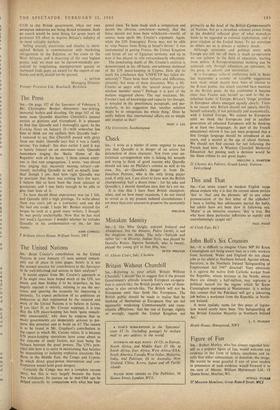The United Nations
SIR,'--Brian Crozier's contribution on the United Nations in your January 15 issue seemed remark- ably out of place in your pages. Surely is it not the normal practice for contributors to the Spectator to be well-informeat and serious in their analyses?
It would appear from Mr. Crozier's approach as if he might once have hoped much of the UN, too much, and then finding it to be imperfect, he has angrily rejected it entirely, refusing to see the suc- cesses and ignoring the necessity for improving it Patiently. To. expect perfection of so ambitious an endeavour as that represented by the creation and work of the United Nations is to believe in fairies, if you like! If, as Mr. Crozier supposes, it is true that the UN peace-keeping has been 'quite remark- ably unsuccessful,' why does he suppose that so many governments arc desperately anxious to pre- serve this potential and to build on it? The reason IS to be found in Mr. Urquhart's contribution to the report to which Mr. Crozier refers. It is because UN peace-keeping operations have come about as the outcome of many factors, not least being the balance between the great powers. The UN's prin- cipal rale here is to assist in maintaining that balance by neutralising or isolating explosive situations like those in the Middle East. the Congo and Cyprus, in which direct great-power intervention and con- frontation would hold great dangers.
Certainly the Congo was not a complete success story, but this is very largely because the force was withdrawn, Its success up to mid-1964 can be pcned since. To have made such a comparison and drawn the obvious conclusion—namely, that the force should not have been withdrawn—would, of course, have spoilt Mr. Crozier's argument. Again, while the UN Emergency Force may not be able to 'stop Nasser from flying at Israel's-throat,' it was instrumental in getting France, the United Kingdom and Israel all out of Egyptian territory, and up to now it has played its rale extraordinarily effectively.
The penetrating depth of Mr. Crozier's analysis is demonstrated in 'his off-hand, one-sentence dismissal of the UN peace-keeping in Cyprus. How did he reach his conclusion that 'UNFICYP has failed dis- astrously'? There have been failures and difficulties, certainly, but none of them disastrous. Why is Mr. Crozier so angry with the 'several dozen poverty- stricken member states'? Perhaps it is part of the malaise suggested above. The real weakness, Mr. Crozier's lack of knowledge and capacity for thought, is revealed in the penultimate paragraph, and par- ticularly, in his suggestion that 'another solution might be to renegotiate the whole thing.' Does he really believe that international affairs arc as simple and utopian as that'?
The University, Southampton
MARC J. LEE

































 Previous page
Previous page